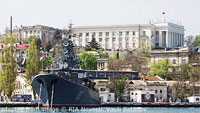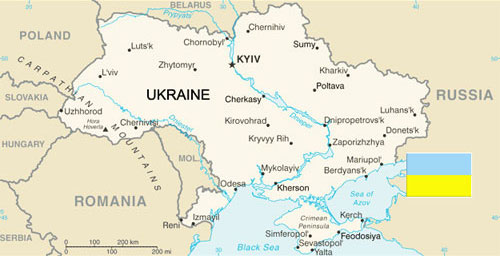Russia to Ukraine’s rescue with $2 billion bailout bond purchase

(Business New Europe – bne.eu – February 18, 2014) Just in the nick of time the Kremlin is stepping in with a fresh Ukrainian bond purchases. The Russian government said on February 18 that it would make a second purchase of Ukrainian bonds handing the government some badly needed cash.
Russian Finance Minister Anton Siluanov said that Moscow will buy $2bn worth of Ukrainian bonds “this week.”
The purchase, made through the Irish exchange, is the second from a total $15bn that Moscow promised Kyiv in a deal struck in December. The first purchase of $3bn worth of bonds was made a week later.
Ukraine is teetering in the edge of economic collapse again. The hryvna has lost more than 10% since the start of the year and is currency trading at just under UAH9/$1. Despite a bump in growth in the last quarter of last year (thanks to a bumper harvest) economist are widely predicting zero growth this year. Retail sales, on of Ukraine’s few economic drivers, have already slumped by a third in the first month of this year according to preliminary reports. And hard currency reserves have almost halved from a year ago to $17.7bn, or less than 2.3 worth of import cover. The state has a heavy debt redemption schedule this with over $6bn of short-term securities coming due just this year and it simply doesn’t have the cash to pay its debt. Some analysts have warned that even with Russian help the country is perilously close to defaulting on its obligations.
While the street violence has died down since the government offered the opposition an olive branch in the form of a general amnesty for demonstrators, who in return agree to leave occupied govt buildings on February 17. The three month old crisis has also weighed on the economy. According to local reports the government has moved much of its spending over to funding extra police since the crisis started last November.
Siluanov’s comments will come as a relief to Kyiv as Moscow threatened to suspend the bond buying programme after Ukraine’s Prime Minister Mykola Azarov quit last month. Moscow has said soon after that it would “wait and see” until a new government is formed.
It is possible (but unlikely) that one of the opposition leaders join the government as an acting prime minister. This could come with a return to the 2004 constitution, which was abandoned in 2010, that would move many of the president’s powers to the Rada.
But the real test will be to see who Yanukovych offers as the new Prime Minister. There are various compromise candidates in addition to the opposition leaders, but the clever money is on making up Ukriane’s acting PM Serhiy Arbuzov, who is close to the Yanukovych clan. If Arbuzov is named as the replacement PM then this would indicate that Yanukovych has no intention of compromising with the opposition, who would reject Arbuzov out of hand.
The Rada is due to hold a session on returning to the 2004 constitution this week that is likely to be a raucous session, but is unlikely to produce any results. In the meantime Ukraine’s economy will be left to muddle through as best it can and Russia will be left to underwrite it. Expect a long series of near-crises for the foreseeable future.
Tim Ash of Standard Bank comments:
In yet another twist to the crisis in Ukraine, the Russian MOF announced yesterday that it was resuming purchases under the Russian bail bond programme for Ukraine. Note that some weeks back and as former prime minister Mykola Azarov appeared on the brink of being ousting, Moscow had delayed further disbursements under the programme – arguing that Ukraine had failed to meet the terms (even though Moscow had previously argued that there were no conditions attached – which few people believed at the time). It turned out, or so Moscow argued, that Ukraine had again built up arrears for gas, to the tune of around USD3.3bn, so Russia indicated that further disbursements would be stalled unless these gas arrears were cleared.
Now if you take the Russian line at face value, Ukraine has presumably cleared debts for gas. And, herein it was notable that this week the NBU provided UAH11.1bn in financial support to the state owned gas transit company, Naftogaz, via a capital injection in the form of new 5Y bonds. The presumption now is that Naftogas used some of these monies to clear some of its debts to Gazprom.
Russia had previously indicated that it would provide USD15bn in support to Ukraine by purchasing Ukrainian sovereign Eurobonds, with 2Y paper, paying a 5% coupon, and the bulk of which will mature in 2015, is just after the presidential elections. It already lent USD3bn in December, and an extra USD2bn suggests that one third of the programme monies will have been disbursed by the end of this week – interesting, despite such a hefty chunk of disbursements it does not appear to have made much of an impact on Ukraine’s precarious financial position. Ukrainian sovereign debt amortisation is already looking very heavy in 2015, at in excess of USD15bn, and likely unmanageable for any incoming administration. An extra USD2bn of short term borrowing will hardly help this equation. Indeed, a new administration will have to think outside the box in terms as to how it will cover these liabilities, including perhaps putting the gas transit system (GTS) up for sale, with Russia appearing as the only likely bidder.
While Russia has denied that any political strings are attached to its support for Ukraine – this is just “brotherly” support for a former Soviet neighbour, but clearly there are very strong political interests being managed and played out here. It was no coincidence in my mind that the financing deal was announced just as two of the main opposition leaders in Ukraine, Klitchko and Yatseniuk were meeting the German Chancellor, Angela Merkel. Perhaps Putin has little respect for the EU in terms of its ability to make decisions quickly, but he is known to respect Merkel as a global political heavyweight, and perhaps Germany’s ability to be a rival pivot for hearts, minds and purses in Ukraine. Hence I think the announcement over the USD2bn disbursement was meant to send a clear message to Merkel, the EU and also US, that Russia remains serious about Ukraine, which it sees as being clearly in its strategic backyard, and is prepared to put its money where its mouth is – again this raises the stakes for the West.
Russia’s new financing also plays into domestic politics in Ukraine. It is perhaps no coincidence that the announcement from Moscow comes as efforts to form a technocratic coalition government in Ukraine seem to have come to nought over the past few days. Indeed, the pro-Yanukovych, Regions majority in parliament has suggested that it will nominate one of its own as the new candidate for prime minister. Suggestions over the past week are that it will be either acting PM Serhiy Arbuzov, deputy PM (and energy sector stalwart) Yuri Boiko, or the head of the presidential administration and former national security chief, Andriy Kluyev. Any of these candidates is likely to be acceptable to Moscow. Arbuzov is probably closest to the “family” around President Yanukovych, and hence the preferred choice for the regime. Hence Russian financing will be seen as providing backing to a Russian-compliant candidate, and sending a clear signal that while Moscow can and is willing to stump up financing to support its interests in Ukraine, the West has been struggling for weeks to come up with some rival financial support package but has thus far come up with nought.
The obvious question now is how the opposition in Ukraine reacts. Over the weekend the Maidan cleared public buildings and cleared something of a route for cars in disputed streets in central Kiev. Efforts to force constitutional reform have though come to very little thus far – with the Regions majority seemingly looking to stall efforts in this regard in parliament yesterday. Further discussion on constitutional reform plans are slated to take place later today, and the opposition is planning a march on the Rada later today to lobby deputies to push an acceptable version of constitutional reform. It seems unlikely at this stage that significant progress will be made. Instead we expect the Rada will probably focus this week on a vote to confirm a new prime minister in office, and likely one of the three candidates noted above. Such action is likely to prove highly confrontational, but the administration will surely think that it has taken back momentum from the opposition, and by nominating a regime (and Moscow) compliant prime minister, and backed by new Russian cash, it is now in the ascendency again. It might be too early to draw such a conclusion, but the ball seems to have been lobbed back in the opposition’s court now, and they have to make difficult decisions as to how to react.

